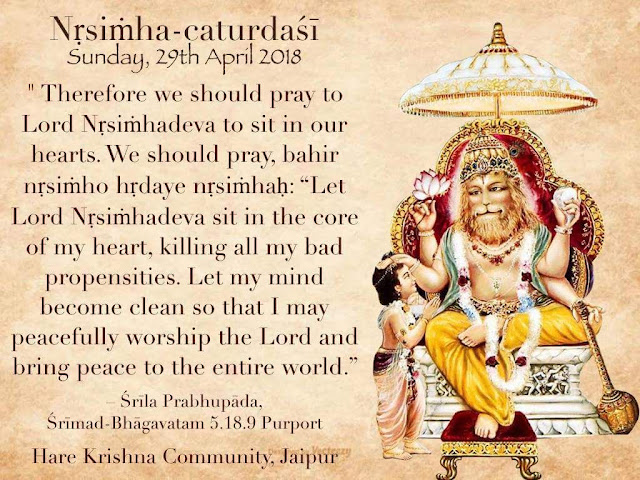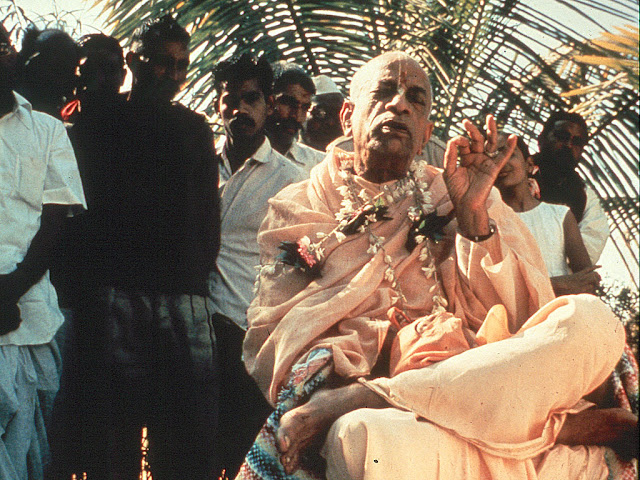Monday 30 April 2018
Saturday 28 April 2018
"You are already self-realized"
Devotee (5): We are becoming happy by distributing your books.
Prabhupāda: Thank you. It is Kṛṣṇa's book. You have got that cake? Give them.
Devotee (5): I was going to say, Śrīla Prabhupāda, I was talking, and I gave a family a big..., a husband and a wife, a big Kṛṣṇa book. The husband took the Kṛṣṇa book. The wife was indifferent. A year later the wife read the Kṛṣṇa book and left her husband and joined the temple, just from reading the one book. And I was very enlivened by this. When you can see the results like that, you become enlivened.
Tripurāri: Just by distributing your books we can become self-realized.
Prabhupāda: You are already self-realized. Otherwise how you can push on the books? You love Kṛṣṇa. Therefore you are taking so much labor for pushing on. And that is self-realization. If anyone tries to establish that Kṛṣṇa is the Supreme Lord, that is self-realization.
Tripurāri: Sometimes the devotees ask if they can take birth again distributing books for you.
Prabhupāda: Very good. That is real devotion. A devotee does not want to go to Vaikuṇṭha or any liberation. They are satisfied with the service. That is pure devotion. And distributing books for the benefit of going to Kṛṣṇa, that is selfishness. But "I want to simply distribute the books without any remuneration, without any my personal..." that is pure devotee.
Just like Prahlāda Mahārāja says that "I do not wish to go to Vaikuṇṭha unless I take all of these rascals with me." That is pure devotee. Pure devotion does not mean to... He is always under the protection of Kṛṣṇa. What is the use of going Vaikuṇṭha or...? Wherever he stays, that is Vaikuṇṭha. That is pure devotional service. Mama janmani janmanīśvare bhavatād bhaktir ahaitukī: [Cc. Antya 20.29, Śikṣāṣṭaka 4] "Life after life I may go on with this business. I don't want anything." That is pure devotion. (About cake:) So distribute.
Room Conversation with Tripurāri -- March 2, 1975, Atlanta
Sunday 22 April 2018
"That is insects' philosophy"
Prabhupāda: So what is the definition of that ideal person?
Śyāmasundara: Well, in some of his books it would be the very heroic type person who sees things as they are.
Prabhupāda: A big robber is also heroic.
Śyāmasundara: Yes. Many of his heroes are robbers and...
Prabhupāda: So these robbers are ideal persons? Big, big thieves.
Śyāmasundara: In that they portray an integrity, self-integrity.
Prabhupāda: Then a tiger is also...
Śyāmasundara: Yes.
Prabhupāda: So why do you fight with the tiger? Why you are afraid of tiger?
Śyāmasundara: His idea of a hero would be someone who meets the tiger face-to-face and courageously deals with him instead of running away. Whenever the challenge in life is there, the hero is the one who takes it up.
Prabhupāda: That is natural. It may be hero or not hero, it doesn't matter. If somebody comes to attack me, I try to fight with him, trying to save me. So I may not be successful, but that is my natural instinct. So everyone is hero.
Śyāmasundara: No. If a person is free of this bad faith, this...
Prabhupāda: What is bad faith and what is good faith, according to him?
Śyāmasundara: Bad faith is that I avoid decision making. I am avoiding decisions. Avoiding making decisions is bad faith.
Prabhupāda: Avoiding making decisions?
Śyāmasundara: Yes. And treating other people as objects. Good faith is to make decisions courageously and follow them out, whatever those decisions are.
Prabhupāda: So who makes the decisions?
Śyāmasundara: I make the decisions.
Prabhupāda: So if your decision is wrong?
Śyāmasundara: There's no question of right or wrong in that case.
Prabhupāda: Whatever decision I make, that is final, absolute?
Śyāmasundara: Yes.
Prabhupāda: How it is possible? Then the same philosophy comes with the insect's decision. Absolute decision, even if it is wrong, it's all right. That is seen in lower animals also.
Śyāmasundara: One of Sartre's counterparts, one of his colleagues, Albert Camus, he also wrote about this philosophy, and himself he typifies this type of person. He simply died in an automobile accident by driving 130 or -40 miles an hour on a small road.
Prabhupāda: That is insects' philosophy, that's all. This is "I have my decision to run hundred miles an hour, not caring for others." So this is exactly like the insects.
Śyāmasundara: And they say I'm responsible for my actions, but it's a very irresponsible position because it doesn't take into consideration other people, or supposing he would have killed other people too.
Prabhupāda: So that is animal decision. That is not human decision. Human decision that there is signboard, "Speed Limit 35." If he doesn't care, he is not a human being, he is animal. A human being, he will take care, "Why shall I drive 100?"
Discussions with Syāmasundara dāsa
Jean-Paul Sartre
Thursday 19 April 2018
you cannot neglect that
Bob: But let us say, when I, in the town I live in I drink boiled water because some of the water has disease in it. Now, why should I drink boiled water? If I have been good enough not to get a disease, then I may drink any water. And if I have been not doing proper, then I shall get diseased...
Prabhupāda: So boiled water is any water also. Boiled water is included within any water.
Bob: But, you see, I drink that to prevent disease.
Prabhupāda: Yes. So long you are in the material world, what is physical laws, you cannot neglect that. Just like if you go to a jungle, there is tiger. It is known that it will attack you. Why should you voluntarily go and be attacked? It is not that a devotee should take physical risk so long he has got some physical body. It is not a challenge to the physical laws: "Oh, I have become a devotee. I challenge everything." That is foolishness.
Anāsaktasya viṣayān yathārham upayuñjataḥ. Viṣaya, these physical necessities, the devotee is advised to accept the necessities of life without any attachment. Physical law is take the boiled water, but if boiled water is not available, does it mean he'll not drink water? If it is not available, you drink ordinary water. [break] We take Kṛṣṇa-prasādam. But while in touring, in hotels sometimes we have to take some food in the hotel. Does it mean, "Oh, I do not take any foodstuff from the hotel, I shall starve"? If I starve, then I'll be weak, I cannot preach. [break]
Talk with Bob Cohen -- February 27-29, 1972, Māyāpura
Monday 16 April 2018
There is a nice song
In illusion one thinks that he can be happy only by fruitive activities, but what actually happens is that one becomes more and more entangled in the network of action and reaction and does not find any solution to the problem of life. There is a nice song in this connection: "Because of a great desire to have all happiness in life, I built this house. But unfortunately the whole scheme has turned to ashes because the house was unexpectedly set on fire."
The law of nature is like that. Everyone tries to become happy by planning in the material world, but the law of nature is so cruel that it sets fire to one's schemes; the fruitive worker is not happy in his schemes, nor is there any satiation of his continuous hankering for happiness.
- Śrīla Prabhupāda, Śrīmad-Bhāgavatam 3.5.2 Purport
Monday 2 April 2018
Krishna Consciousness means we should always be satisfied and happy
My dear Tejiyas,
Please accept my blessings. I am in due receipt of your letter dated December 10, 1972, and I am very much disturbed to hear from you that you have become disturbed in your mind. Do not be disturbed. There is no cause for anxiety. You are doing your best to serve Krishna, that is very much appreciated, so do not lose enthusiasm out of frustration, that will spoil everything. Krishna Consciousness means we should always be satisfied and happy, not that we must work something impossible, becoming overburdened, and then because we are unhappy by so much trouble we lose enthusiasm altogether and give up all hope. No, if too much endeavour is there, that is to be avoided. By all means we must preserve our spiritual status, that is the point, not that we are mad after big buildings, many devotees, life-members, this, that—no, these are only ways to engage the devotees so that they may apply the principles of devotional living to some kind of work for practical realization of these principles. It is not the result of the work we want. If only one person daily, if we sincerely preach to such one person in a day, that is sufficient, never mind big, big programmes. So my request to you is that you do not be bothered by these things, and I have instructed Tamala Krishna and Syamasundara to send you men, so they will do it, rest assured. Krishna does not like to see His sincere devotee suffer or become frustrated or depressed. He will not stand idly by in any such case, so do not fear on that account. Krishna has got some plan for you, always think in that way, and very soon He will provide everything to your heart's desire.
- Srila Prabhupada's letter to Tejiyas, Bombay, 19 December, 1972
Subscribe to:
Posts (Atom)







